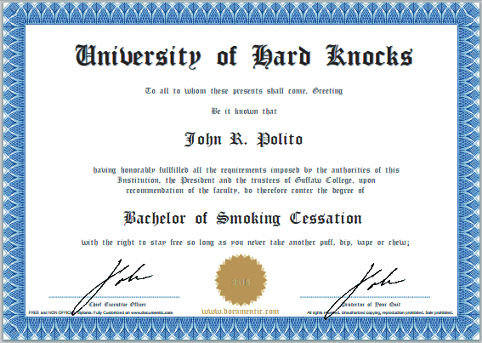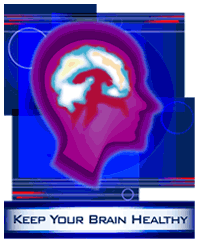In 1984, Joel wrote an article with the heartless sounding title, "The Lucky Ones Get Hooked."[1] Frankly, it's anything but callous.
It makes the important point that those who experience full relapse within a few days of taking a puff, dip, vape, or chew are fortunate in that the experience offers potential to self-teach them the most critical recovery lesson of all, "The Law of Addiction."
In the Brandon study, while nearly half who lapsed experienced full relapse within one day, the study's mean average from lapse to relapse was nine days.
Those who quickly experience full relapse increase the likelihood of learning, right away, the critical lesson of the power of using nicotine just once.

But the more time and distance between that first use and full dependency resumption, the greater likelihood of learning the wrong lesson, a lesson that for far too many smokers proves deadly.
"The ex-smoker who takes a drag and doesn't get hooked gets a false sense of confidence," writes Joel. "He thinks he can take one any time he wants and not get hooked. Usually, within a short period of time, sneaking a drag here and there, he will become hooked."
"One day he too may try to stop and actually succeed. He may stop for a week, month, or even years. But always in the back of his mind, he feels, 'I know I can have one if I really want to. After all, I did it last time and didn't get hooked right away.'"
"One day, at a party, or under stress, or just out of boredom, he will try one again. Maybe this time he will get hooked, maybe not. But you can be sure that there will be a next time. Eventually, he will become hooked again."
Living a series of perpetual relapses, trying to break free again and again and again, each time enduring withdrawal and recovery is no way to live. "Taking the first drag is a no-win situation," cautions Joel.
Over the years, hundreds of millions of ex-users have discovered the power of one puff, dip, vape, or chew totally on their own. But with the arrival of each new magic cure, self-discovery of the Law of Addiction has become increasingly difficult.
If old enough, think back to 1980, before arrival of nicotine replacement therapy (NRT) and nicotine gum. Remember the traveling smoking cessation hypnotist coming to town? There really wasn't much else.
The only other real alternatives to cold turkey were gradual weaning or tapering schemes, with extremely dismal results (roughly half as effective as cold turkey/abrupt cessation).[2]
The likelihood of any particular attempt being cold turkey was substantial. Thus, the odds of self-discovering the Law of Addiction were good.
Absent was the negative influence of pharmaceutical and e-cigarette industry marketing, marketing aimed at shattering both natural learning and confidence in our recovery instincts.
Cold turkey had cornered the recovery market. When NRT arrived the industry saw no alternative but to attack it. Three decades of industry brainwashing has falsely painted cold turkey as nearly impossible with few succeeding.
Today, the e-cig industry pretty much ignores nicotine cessation.
In 2019, Juul held a 75% share of the U.S. e-cigarette market. Juul knows that the vast majority who successfully arrest their dependence upon nicotine do so by going cold, not by gradual weaning schemes.
An August 2020 Google search for any reference to "cold turkey" on Juul.com produced zero search results.
Even worse, searches of "how to stop" and "how to quit" came up empty too. This despite 367 search results containing the cloned assertion that "nicotine is an addictive chemical."
Cold turkey is free yet poor. It has no bank account, economic muscle, or political clout. Pharmaceutical industry attacks, false representations, and its gradual takeover of government cessation policy went largely unnoticed and unchallenged.[3]
Sadly, pharmaceutical industry financial influence has played a massive role in authoring official national cessation policy in nearly every developed nation on earth.[4]
Unopposed, by June 2000 the industry's muscle had grown so powerful here in the U.S. that cessation policy was rewritten so as to make use of pharmaceutical industry cessation products mandatory unless the user's medical condition prohibited it.[5]
Instead of teaching the Law of Addiction and the power of nicotine to foster relapse, the pharmaceutical industry teaches that nicotine is "medicine" and its use is "therapy."
It has never made a commercial announcing to smokers that it redefined "stopping smoking" from its traditional meaning of ending both smoking and nicotine use, to just a single method of nicotine delivery, smoking it.
The industry has yet to reveal that its more than 200 "medication" studies were not about drug addicts arresting their chemical dependence upon nicotine. Those studies did not test body fluids to see if any participant actually became nicotine-free. Instead, they tested the breath of participants for expired carbon monoxide, to see if participants had stopped smoking it.
One of the best-kept industry secrets is the percentage of former smokers who continued to remain dependent upon replacement nicotine at study's end or who turned to oral tobacco.
That's why it's so important that each of us teach the Law of Addiction to users within our sphere of influence. Why? Because jumping from product to product while fearing your natural recovery instincts, it's getting harder and harder to self-discover the Law.
Ignorance is a horrible reason to continue handing the neo-nicotine industry your money until the day you die.
Just one rule - "No Nicotine Today!"
While there are hundreds of stop smoking books and quick-fix magic cures promising near painless and sure-fire success, there is only one principle which if followed provides a 100% guarantee of staying clean ... "no nicotine today."
While the Brandon, Boreland, and Garvey studies afford the junkie mind a tiny sliver of junkie thinking wiggle-room in believing that the "Law" can be cheated, it's impossible to fail by living it as an absolute.

Why test the ability of our dopamine pathways to make pathway-activating events nearly impossible to forget or ignore in the short term (the time needed for recovery)? Why challenge our brain's design? Why toy with disastrous odds?
Fully accept that one hit will be too many, while thousands never enough. And remember, it is impossible to fail so long as all nicotine remains on the outside. Yes, still only one rule, none today!
References:
2. Cheong Y, Yong HH and Borland R, Does how you quit affect success? A comparison between abrupt and gradual methods using data from the International Tobacco Control Policy Evaluation Study, Nicotine & Tobacco Research, August 2007, Volume 9(8), Pages 801-810; also see West R, Fidler J, Smoking and Smoking Cessation in England 2010, August 13, 2011, www.smokinginengland.info, STS 23.
3. Polito, JR, Flawed research equates placebo to cold turkey, WhyQuit.com, March 12, 2007.
4. Helliker, K, Nicotine Fix - Behind Antismoking Policy, Influence of Drug Industry, Wall Street Journal - February 8, 2007, Page A1; also see, Polito JR, U.S. quit smoking policy integrity drowns in pharmaceutical influence, WhyQuit.com, May 13, 2008.
5. Polito, JR, Does updated tobacco treatment "Guideline" reflect sham science? WhyQuit.com, May 5, 2008.
All rights reserved
Published in the USA
